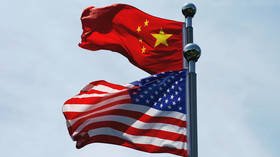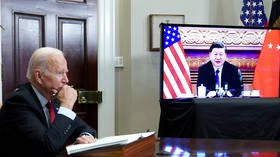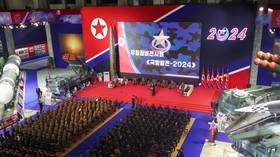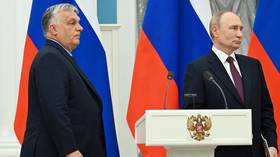The unlikely location where the US-China cold war is really heating up

A remote South Pacific state is currently playing host to a political drama, apparently encouraged by Washington, that could result in partition – and have a major impact on US-China relations.
You may not be familiar with the Solomon Islands, but what’s going on in the small South Pacific nation at the moment could have real significance.
Located close to Papua New Guinea and not too far from Australia, it was once a British protectorate. In World War II, a series of bloody battles were fought there between the Allies and Japan, which saw tens of thousands of people lose their lives. Despite gaining its independence in the 1970s, that legacy has remained by way of a defence pact with Australia, and it still retains the British monarchy.
Recently, this little-known country has been making headlines again. In late 2019, the Solomon Islands made the decision to stop recognizing Taiwan and seek more links with the People’s Republic of China, a move that prompted outrage in Washington – despite the fact it is obvious that establishing ties with Beijing would be more economically beneficial to the archipelago.
And now, in the latest twist to the story, the Solomon Islands’ Prime Minister Manasseh Sogavare has survived a no-confidence vote at the national parliament. The vote was brought about by violent unrest; for the past few weeks the country has been subject to extreme anti-China riots, which have seen mobs destroying and burning Chinese-run businesses across the islands. Opposition politicians wasted no time in saying that, should the government be toppled, the country ought to reinstate ties with Taiwan.
But this is more than just opportunism. There is evidence that the United States and Taipei are continuing to exercise influence in a rebellious province of the island known as Malaita, with the premier there banning Chinese companies and accepting American development aid. Sogavare has been critical of the province’s actions and, blaming its government, said, “The call for me to resign and this motion was made against the backdrop of an illegal attempted coup.”
Why is the Solomon Islands relevant? Despite its small size and a population of no more than 600,000, the archipelago finds itself in the middle of a political theatre, the battle for the future of the Pacific, seen as the most strategically critical region in the world.
At the heart of the effort is the bid to try and contain China, with the United States and its allies seeking to stop Beijing from dominating the region economically and militarily. The tiny island nations which comprise Melanesia and Polynesia are high on the agenda, as was illustrated by Australia coordinating its telephone company Telstra to buy the region’s largest communications operator.
The Solomon Islands, however, is a particular sore point for the US, precisely because it represents an expansion of China’s ‘nfluence’ into an island nation which has traditionally fallen under the Anglophone world’s dominance. This makes it a serious strategic liability.
Since 2018, US foreign policy has switched from standing idly by and allowing countries to flip ties from Taiwan to Beijing, to active discouragement, with threats of downgrading relations and penalties against countries who do so, as affirmed by the TAIPEI Act.
In 2018, it recalled a number of ambassadors from countries for doing so. But in addition to just showing disapproval, what is happening in the Solomon Islands suggests that the US is prepared to actively interfere in countries switching ties, and undermine their governments.
Since the Solomon Islands’ decision to switch ties to China, the US has subtly responded by strengthening ties not with the country as a whole, but with the pro-Taiwan Malaita, which has some discord with the central government over the switch.
As noted in the Associated Press, since 2020 the US has provided $25 million in “aid” to the province exclusively, while Taiwan itself has also provided specific assistance (its whole foreign policy is centred around attempting to exploit discontent against Beijing to find political space for itself). Even Australia’s ABC News has reported that there are obvious geopolitical games at play. The Global Times, on the other hand, has blamed Taipei.
While the dissenters have failed to topple the pro-China government of Sogavare, this doesn’t mean the problems will go away. Leading opposition voice Daniel Suidani, the premier of Malaita, stated independence for the province would be an option if the no-confidence vote failed – which it has – and his allegiance was abundantly clear, as he wore a ‘USAID’ t-shirt while making his pledge.
It is perfectly reasonable to wonder, then, if America’s specific intention is to partition the Solomon Islands. If Washington cannot get the country to cut ties with Beijing, then it could simply orchestrate its peaceful partition and dominate its most populous province, which would then again become Taiwan’s ally.
Either way, at this stage the evidence seems to suggest that the Solomon Islands could mark the first illicit regime change effort of the new cold war – the first attempt of the US to undermine a sitting government with a view to containing Beijing.
This is a familiar playbook – we saw it many, many times during the original Cold War, most prominently in Latin America. Given this, it is clear that if the Solomon Islands wants to have diplomatic relations with Beijing, it must be ready to protect its national sovereignty and territorial integrity from the Anglophone sphere of dominance it has long existed within.
The statements, views and opinions expressed in this column are solely those of the author and do not necessarily represent those of RT.

















